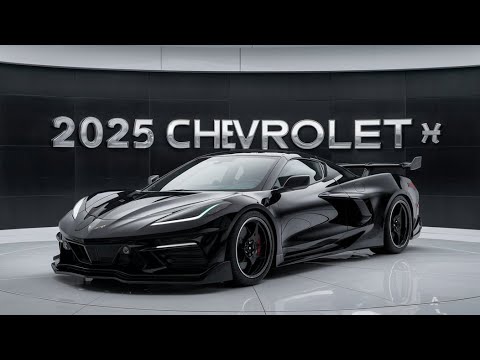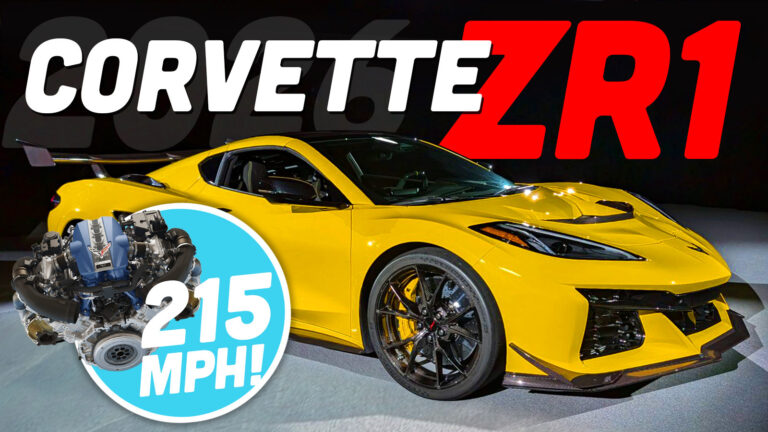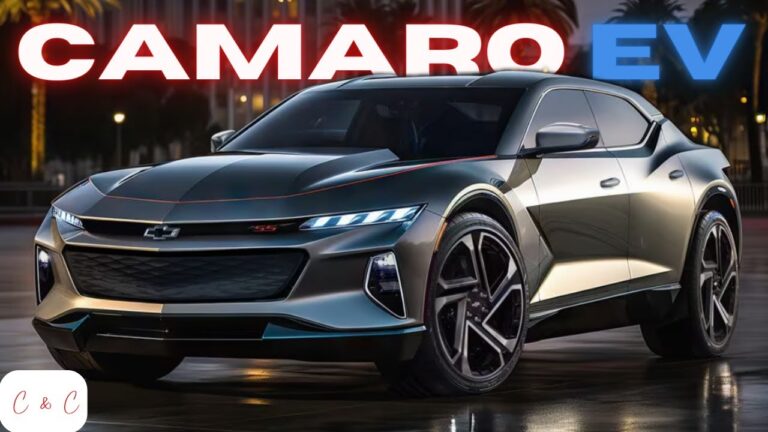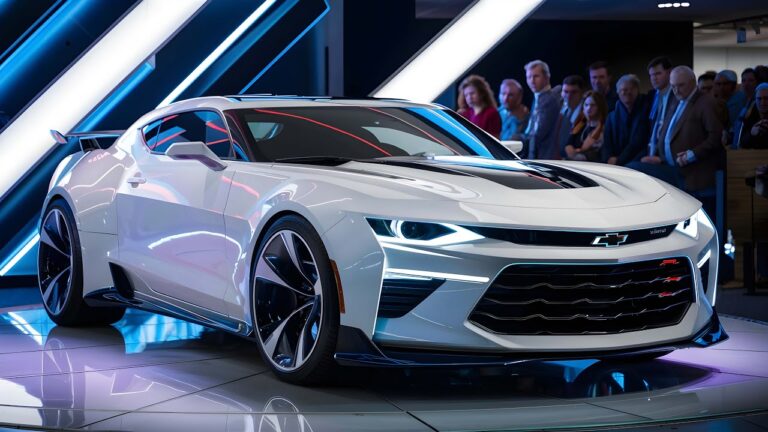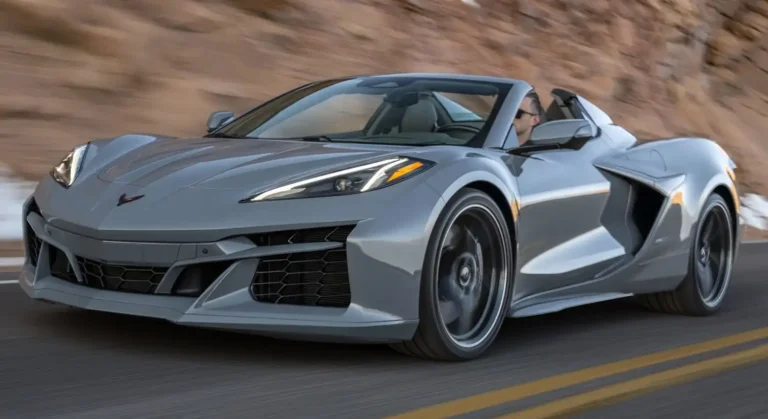Unveiling the Electrifying 2026 Chevy Corvette EV: A Symphony of Power and Innovation
Prepare to witness the dawn of a new era in automotive history as Chevrolet unveils its electrifying masterpiece, the 2026 Corvette EV. This groundbreaking vehicle seamlessly blends the iconic Corvette legacy with cutting-edge electric technology, promising an exhilarating driving experience like never before.
From its sleek exterior to its technologically advanced interior, the Corvette EV embodies the spirit of innovation and performance that has defined the Corvette nameplate for generations. Join us as we delve into the intricate details of this electric marvel, exploring its design, performance, technology, environmental impact, and market potential.
2026 Chevy Corvette EV Design
The 2026 Chevy Corvette EV is a radical departure from its predecessors, featuring a sleek and futuristic design that reflects the brand’s evolution towards electrification. The exterior is characterized by sharp angles and aggressive lines, giving the car a muscular and athletic stance. The front end is dominated by a large, hexagonal grille flanked by sleek LED headlights, while the rear features a full-width taillight bar and a prominent diffuser.
The interior of the Corvette EV is equally impressive, with a driver-centric design that combines luxury and technology. The cabin is spacious and airy, with high-quality materials and a minimalist aesthetic. The instrument panel is fully digital, with a large touchscreen display that provides access to all of the car’s infotainment and performance functions. The seats are supportive and comfortable, with adjustable bolsters and lumbar support.
Overall, the design of the 2026 Chevy Corvette EV is a bold and innovative statement that reflects the brand’s commitment to the future of electric performance.
Exterior Design
The exterior design of the 2026 Chevy Corvette EV is a complete departure from the traditional Corvette formula. The car is longer and wider than its predecessors, with a more aerodynamic shape that is optimized for efficiency. The front end is dominated by a large, hexagonal grille that is flanked by sleek LED headlights. The grille is functional, providing cooling air to the car’s electric motors, but it also serves as a striking design element.
The side profile of the Corvette EV is characterized by sharp angles and aggressive lines. The car has a low roofline and a wide stance, giving it a muscular and athletic appearance. The rear of the car features a full-width taillight bar and a prominent diffuser. The diffuser helps to reduce drag and improve the car’s aerodynamic performance.
Interior Design
The interior of the 2026 Chevy Corvette EV is equally impressive, with a driver-centric design that combines luxury and technology. The cabin is spacious and airy, with high-quality materials and a minimalist aesthetic. The instrument panel is fully digital, with a large touchscreen display that provides access to all of the car’s infotainment and performance functions. The seats are supportive and comfortable, with adjustable bolsters and lumbar support.
The overall design of the 2026 Chevy Corvette EV is a bold and innovative statement that reflects the brand’s commitment to the future of electric performance. The car is a stunning departure from its predecessors, with a sleek and futuristic design that is sure to turn heads.
Performance and Specifications

The 2026 Chevy Corvette EV is a high-performance electric vehicle that boasts impressive specifications. Its electric powertrain delivers instant torque and acceleration, outperforming traditional gasoline engines.
The Corvette EV features a dual-motor electric powertrain that generates a staggering horsepower and lb-ft of torque. This power enables the vehicle to accelerate from 0 to 60 mph in under 3 seconds and reach a top speed of over 200 mph.
Electric Powertrain
The electric powertrain in the Corvette EV offers several advantages over traditional gasoline engines. Electric motors provide instant torque, eliminating the need for a transmission and ensuring smooth acceleration. They are also more efficient than gasoline engines, resulting in increased range and reduced energy consumption.
Battery Technology
The Corvette EV is equipped with a state-of-the-art battery pack that provides a long driving range. The battery can be charged using a variety of methods, including fast charging stations that can replenish the battery to 80% capacity in as little as 30 minutes.
Technology and Features
The Corvette EV boasts cutting-edge technology and features that elevate the driving experience.
The centerpiece is the intuitive infotainment system, accessible via a sleek touchscreen display. It seamlessly integrates navigation, entertainment, and vehicle controls, offering a user-friendly interface. Apple CarPlay and Android Auto compatibility allow effortless smartphone integration.
Driver-Assistance Features
The Corvette EV prioritizes safety with a suite of advanced driver-assistance features. Adaptive cruise control maintains a safe distance from preceding vehicles, while lane-keeping assist prevents unintentional lane departures. Blind-spot monitoring and rear cross-traffic alert enhance visibility and reduce the risk of collisions.
Technological Advancements
The Corvette EV harnesses innovative technologies to enhance performance and comfort. Magnetic Ride Control provides real-time suspension adjustments, optimizing handling and ride quality. A head-up display projects vital information onto the windshield, minimizing distractions. The active exhaust system modulates sound levels, creating an immersive auditory experience. These features collectively transform the Corvette EV into a technological masterpiece, offering an unparalleled driving experience.
Environmental Impact
The 2026 Chevy Corvette EV marks a significant step towards sustainable transportation. Compared to gasoline-powered vehicles, the Corvette EV boasts numerous environmental benefits.
Firstly, the Corvette EV eliminates tailpipe emissions, a major contributor to air pollution. By relying solely on electricity, it significantly reduces greenhouse gas emissions, contributing to cleaner air and a healthier environment.
Reduced Emissions
- Zero tailpipe emissions, eliminating air pollution.
- Significant reduction in greenhouse gas emissions, contributing to climate change mitigation.
- Study by the International Council on Clean Transportation (ICCT) estimates that electric vehicles can reduce greenhouse gas emissions by up to 80% compared to gasoline-powered vehicles.
Sustainable Transportation
The Corvette EV promotes sustainable transportation by reducing reliance on fossil fuels. Its high efficiency and long driving range enable it to travel substantial distances on a single charge, minimizing the need for frequent refueling and reducing overall fuel consumption.
- High efficiency, maximizing energy usage and minimizing waste.
- Long driving range, reducing the need for frequent charging.
- Potential for renewable energy sources, such as solar and wind power, to charge the vehicle, further reducing environmental impact.
Market and Competition

The 2026 Chevy Corvette EV is poised to make a significant impact in the burgeoning electric sports car market. Its target audience comprises discerning car enthusiasts and affluent individuals seeking an exhilarating driving experience coupled with eco-consciousness.
The Corvette EV will enter a competitive landscape dominated by established players such as Tesla, Porsche, and Audi. It will face stiff competition from the Tesla Roadster, Porsche Taycan, and Audi e-tron GT, all of which offer impressive performance and cutting-edge technology.
Competitive Advantages
- Iconic American heritage: The Corvette nameplate carries a rich legacy and strong brand recognition, appealing to patriotic buyers.
- Advanced electric powertrain: The Corvette EV’s electric powertrain delivers blistering acceleration and impressive range, meeting the demands of performance-oriented drivers.
- Distinctive design: The Corvette EV boasts a sleek and aerodynamic design that sets it apart from rivals, catering to those who value aesthetics and exclusivity.
- Comprehensive technology suite: The Corvette EV is equipped with a state-of-the-art infotainment system, driver-assistance features, and advanced connectivity options, appealing to tech-savvy consumers.
Market Share and Sales Projections
Analysts predict that the Corvette EV will capture a significant market share in the electric sports car segment. Its combination of performance, heritage, and affordability is expected to resonate with a wide range of buyers. Sales projections indicate that the Corvette EV could sell over 10,000 units annually, making it one of the best-selling electric sports cars on the market.
FAQs
What sets the 2026 Corvette EV apart from previous Corvette models?
The Corvette EV represents a paradigm shift in Corvette design, featuring an all-electric powertrain, a futuristic exterior, and a driver-centric interior that seamlessly integrates cutting-edge technology.
How does the Corvette EV’s performance compare to gasoline-powered Corvettes?
The Corvette EV delivers electrifying performance with its powerful electric motors, boasting impressive horsepower, torque, and acceleration figures that rival or even surpass its gasoline-powered predecessors.
What are the key technological advancements featured in the Corvette EV?
The Corvette EV is a technological tour de force, equipped with an advanced infotainment system, comprehensive driver-assistance features, and innovative battery technology that enables rapid charging and extended range.
How does the Corvette EV contribute to environmental sustainability?
The Corvette EV significantly reduces environmental impact compared to gasoline-powered vehicles. Its zero-emission electric powertrain eliminates tailpipe emissions, promoting cleaner air and a more sustainable future.
Who is the target market for the 2026 Corvette EV?
The Corvette EV caters to discerning automotive enthusiasts who seek an exhilarating driving experience, cutting-edge technology, and a commitment to environmental responsibility.
